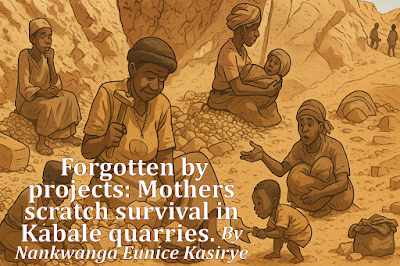Unlock this content
To be a mother is to surrender your original self and live entirely for others. The moment God chooses you to co-create life, your rebirth begins…not once, but as many times as the lives you deliver. With each child, a woman’s old version fades… desires, dreams, her name…leaving only what is needed for the survival of the new.
Motherhood begins by losing. You lose your body to pregnancy, your cravings to nausea, your comfort to gaining or losing weight, and your rest to anxiety. You lose the luxury of self, because every breath, every bite, every plan begins to revolve around protecting someone else.
But it doesn’t stop at birth.
You deliver the baby into the world regardless of the pain, the bleeding, the fear. And just when the world celebrates a new life, the mother begins a new journey of quiet sacrifice. Breastfeeding, nursing, calming cries in the night, and surrendering her voice for the sake of peace. She compromises. She tolerates. She accepts what she once would have fiercely rejected just because the one she birthed must thrive.
In many African communities, this sacred responsibility isn’t written in policy documents or parenting manuals. It is passed down through blood, duty, and cultural knowing. Here, in the places untouched by boardroom tables, motherhood is the only governance that works.
Teddy Karahandi, 74, is one such mother. She has given birth and been reborn-many times. Today, she lives with ten people under her roof: her son, his wife, and their children. She’s not just the matriarch; she is the provider, caretaker, and hope-holder. She limps through the dust of a stone quarry in Kabale Municipality, western Uganda—crushing rocks beside her grandchildren to buy food and pay school fees.
Her daughter-in-law crushes stones beside her. Her son, meanwhile, disappears. “He works once in a while, and when he earns, he drinks,” Teddy says. So, she steps in. She has to. At 74, she becomes a mother again…for the children and grandchildren she now raises. Every cough, every scrape, every tear-she absorbs them like a sponge. Her clothes are coated in dust, her body bent from injury, her spirit quietly enduring.
In this dusty quarry, motherhood wears no crown but scars.
Faustine Kyomugisha, 65, has already lost a finger to the quarry, she accidentally hit her finger with a hummer while scratching survival from the quarry. Her body is frail, her lungs weak, yet every morning, she still picks up her hammer and joins the line of women crushing stones. “I have no garden, and no one to help me,” she says. “So I must work.” Even when her body screams no, her motherhood says yes. Because in her world, to stop is to let your reborns starve.
On average, one earns about 20,000 shillings a week- less than ten dollars. Yet with that, they must feed families, pay school fees, and cover medical needs. The health risks are everywhere…dust, infections, malaria, injuries, and poor sanitation, but still, the mothers show up each day, because they have nowhere else to go, and nothing else to rely on.
And then there is Tukamushabe Catherine, only 21. She cradles her new-born on one side and balances a hammer on the other. Her one-year-old toddles nearby, breathing the same dust she does. “I had dreams,” she says softly. “I wanted to return to school after P.7, but my mother handed me a hammer and said—this is life now.”
She cried for three days.
She is a new mother, barely out of girlhood herself. Yet the expectations of motherhood rushed in like a storm. Now, like her mother before her, she has become both protector and provider in a quarry that kill dreams with every stone.
These women live the purest form of motherhood. Not the kind adorned with hashtags or celebrated with brunch on Mother’s Day, no! but the kind written in the soil, the dust, the fatigue, and the fierce love that never leaves. They are reborn with every child, and yet never fully seen.
In development circles, we speak of climate change, environmental degradation, and economic vulnerability…but what do those concepts mean to mothers like Teddy, Faustine, and Catherine? They’re not invited into boardrooms. They’re not asked for their opinion. Yet they live the cost of every failed policy, every half-implemented project.
Their quarries, once forests, are now scarred earth. The rivers they once fetched from now run shallow. Their children cough from dust while policy briefs discuss “sustainability.” They are used as case studies but never consulted as authorities.
When these mothers wear out, they are quietly buried. No grave stones. No legacy reports. Just a pit in the ground covered with red earth. Rain comes, washes the earth away-wild stones take their place. The woman, the mother, the backbone-forgotten.
Some die choking in traditional kitchens, inhaling smoke as they cook for the lives they helped create. Others collapse in fields or quarries from disease, exhaustion, and broken bones. Their deaths are not accidents-they are the final price of a life poured into others as they ware out, never recovering their original old self.
So when we speak ofReality to Boardroom, we must ask...whose reality? Because in African communities, such as Kabale, where these mothers live, there are no chairs around polished tables, PowerPoints neither consultations.
There is only motherhood…unpaid, unseen, engraved into the definition of life.
If development wants to matter in communities such as Kabale quarries, it must begin with dust-covered hands, cracked feet, and the quiet strength of mothers who were reborn too many times-yet never given time to heal.
TELL YOUR STORY : SHARE YOUR VOICE
NEED HELP START YOUR PERSONAL BLOG OR WRITE YOUR STORY
I CAN HELP
CONTACT ME ON +256772683801 OR kasiryeeunice@gmail.com


